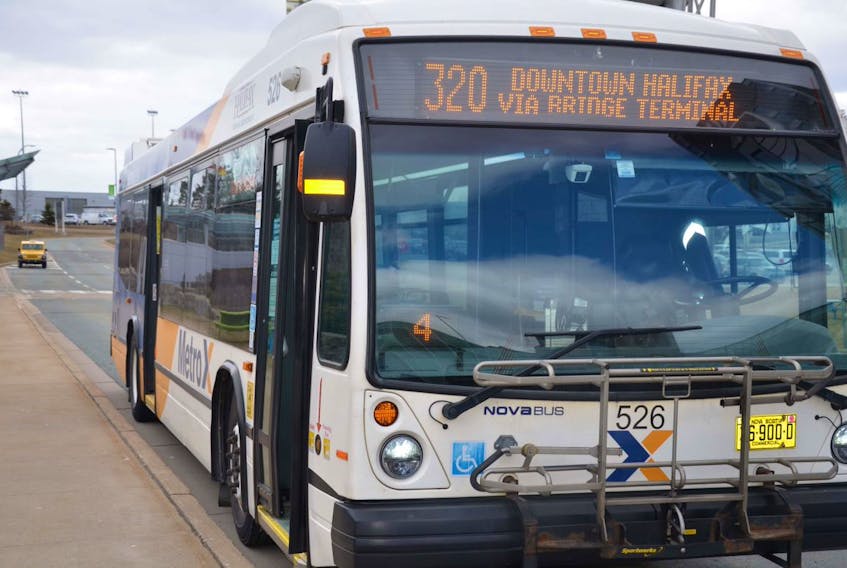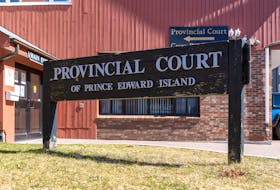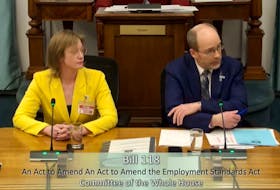Halifax Transit coughs up municipal funds every time a bus fires up its engine.
“Approximately $9.7 million,” Erin DiCarlo, a communications adviser with Halifax Regional Municipality, said of how much it costs to keep the transit system up and running for a month.
That amount, almost 10 per cent of the monthly cost to operate the entire municipality during the COVID-19 pandemic, was palatable when Halifax Transit was taking in money from bus and ferry fares, from property taxes and special transit rates.
Although the province has decided that Halifax Transit is an essential service, the municipality weeks ago felt compelled to suspend the collection of fares to ride the bus or take the ferry while the pandemic persists.
“It is not the municipalities that have deemed transit an essential service,” said Coun. Lorelei Nicoll (Cole Harbour-Westphal). “Yet, we are the ones providing it and with no fares coming in and the cleaning of the buses, all those things come as an expense.”
In its 2020-21 budget presentation earlier this year, Halifax Transit projected an operating expense of nearly $118 million for the fiscal year. Of that, transit projected that nearly $86 million in revenues would be gathered to offset expenses, particularly from an area rate on property taxes of more than $47 million and fee revenues of $36.5 million. The tax revenues include an additional transit tax for people who live within a kilometre of a bus stop.
The first instalment of residential and commercial property taxes was to be paid by the end of April, but because so many businesses are closed and so many individuals are out of work, council voted earlier this month to defer the interim bill due date to June 1. Those who can afford to pay their taxes early were implored to do so.
DiCarlo says that weekday bus service has been cut by about 30 per cent and ferry service by 37 per cent as ridership has fallen by 75 per cent. Still, the $9.7-million monthly bill to operate the transit system exists.
Something has to give and Nicoll says that something is federal assistance.
As council’s representative on the Canadian Urban Transit Association (CUTA), Nicoll will bring to Tuesday’s virtual regional council meeting a request from CUTA to the federal government for “emergency funding of $400 million a month in revenue relief to keep services running as fare box and other revenue drops by up to 100 per cent.”
The request from CUTA, an advocacy group that brings collective municipal transit issues to Ottawa, will also include a $1.2 billion ask to bridge as many as 40 per cent of the country’s transit systems over the coming months to help keep buses and trains running.
The CUTA request also asks for support to cover the costs of disinfectants and protective equipment for transit employees because the association says more than 70 per cent of transit providers have reported difficulty securing cleaning supplies and protective gear.
“This is a collective approach by all of the transit (providers) across Canada,” Nicoll said. “The prime minister has alluded to it when he speaks that help will be coming but nothing’s coming yet. This is a way of saying make it a priority for the municipalities to help them with their transit.”
Nicoll said the requested funds would be divvied up by transit systems across the country, depending on the size of the service. She said some municipal transit operators get help from the provinces in which they operate, but that is not the case in Nova Scotia. Nicoll said provincial assistance or the lack of it probably wouldn’t play into how much individual transit operators can get from Ottawa.
The motion says public transit needs federal support to get essential workers to work and to help people do things essential for day-to-day life.
The Halifax Transit situation is symptomatic of the larger financial problem the municipality faces.
Jacques Dube, chief administrative officer of HRM, and other municipal officials have said the municipality is financially sound but operating expenses of $100 million per month are required to provide services, pay suppliers and vendors and to support capital projects.
Tax revenue makes up 82 per cent of municipal revenue and much of that has been deferred.
“A number of residents have paid their tax bills in advance and the municipality continues to have revenue come in on a daily basis,” DiCarlo said, citing other revenue streams like permit fees and rental money from municipally owned facilities.
DiCarlo said the municipality has strong financial reserves and will be looking at all expenditures in recasting its 2020-21 budget, likely next month.
As is the case with transit, national and provincial organizations that include the Federation of Canadian Municipalities and the Nova Scotia Federation of Municipalities continue to lobby the federal government for assistance for municipalities, DiCarlo said.
None has been provided yet but discussions continue.









